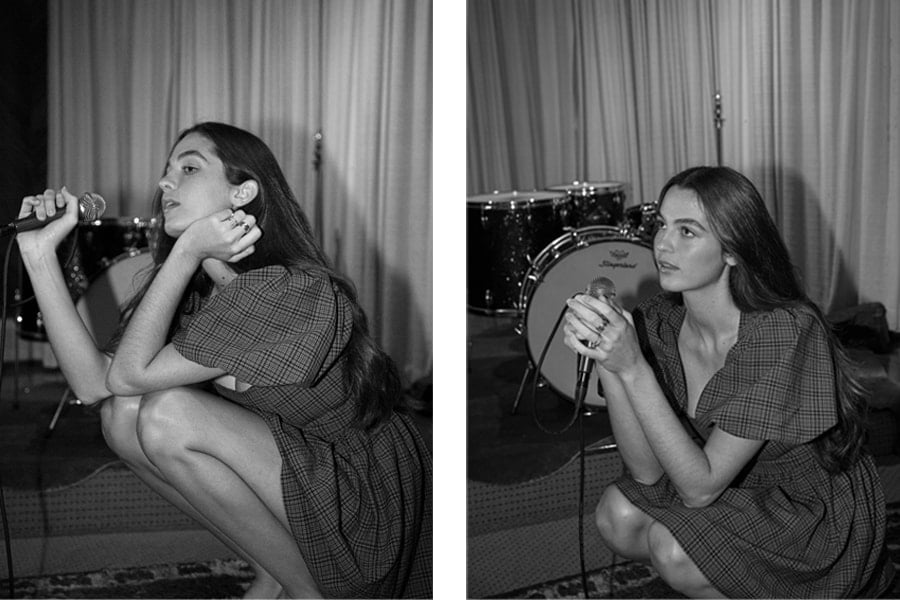
Kita Alexander is reflecting on what scares her most, creatively speaking.
"I’ve always disliked really small and intimate shows, where there’s only a few people in the room, when people are looking into my soul," she explains. "At least through a song, you’re getting my soul but, it’s on radio and I’m over here.”
It’s intriguing, if only because it seems emphatic bravery is Alexander's general default. By age 21, the singer, songwriter, mother had launched a successful music career (with the Kitsuné approved My Own Way), helped bring her husband (then her relatively new boyfriend) surfer Owen Wright back to health after a traumatic brain injury, survived personal tragedy, and given birth to her son (at home, no drugs).
Much of this has made it into her lyrics, more intrinsically than intentionally. But if singing at close range puts Alexander off balance, the song making process is where she finds her power.
Raised on Fleetwood Mac, Joni Mitchell and Patti Smith, she began her career playing covers at pub gigs and listening to nothing else. As her career has progressed, with her tendency to write songs that play over in the mind, she’s come to reconsider pop as a concept. Now, she says, she prefers to sound like herself. Despite 2020’s limitations on a would-be touring artist, Alexander’s 24th year has been creatively fruitful. She’s released two singles, Against The Water and I Miss You, I’m Sorry – following last year’s Between You & I, her first since Hotel in 2017 – with more, she hopes, to come soon.
Here, Alexander talks on the meeting points of parenthood and creation, finding clarity through song writing and being the first to say sorry.
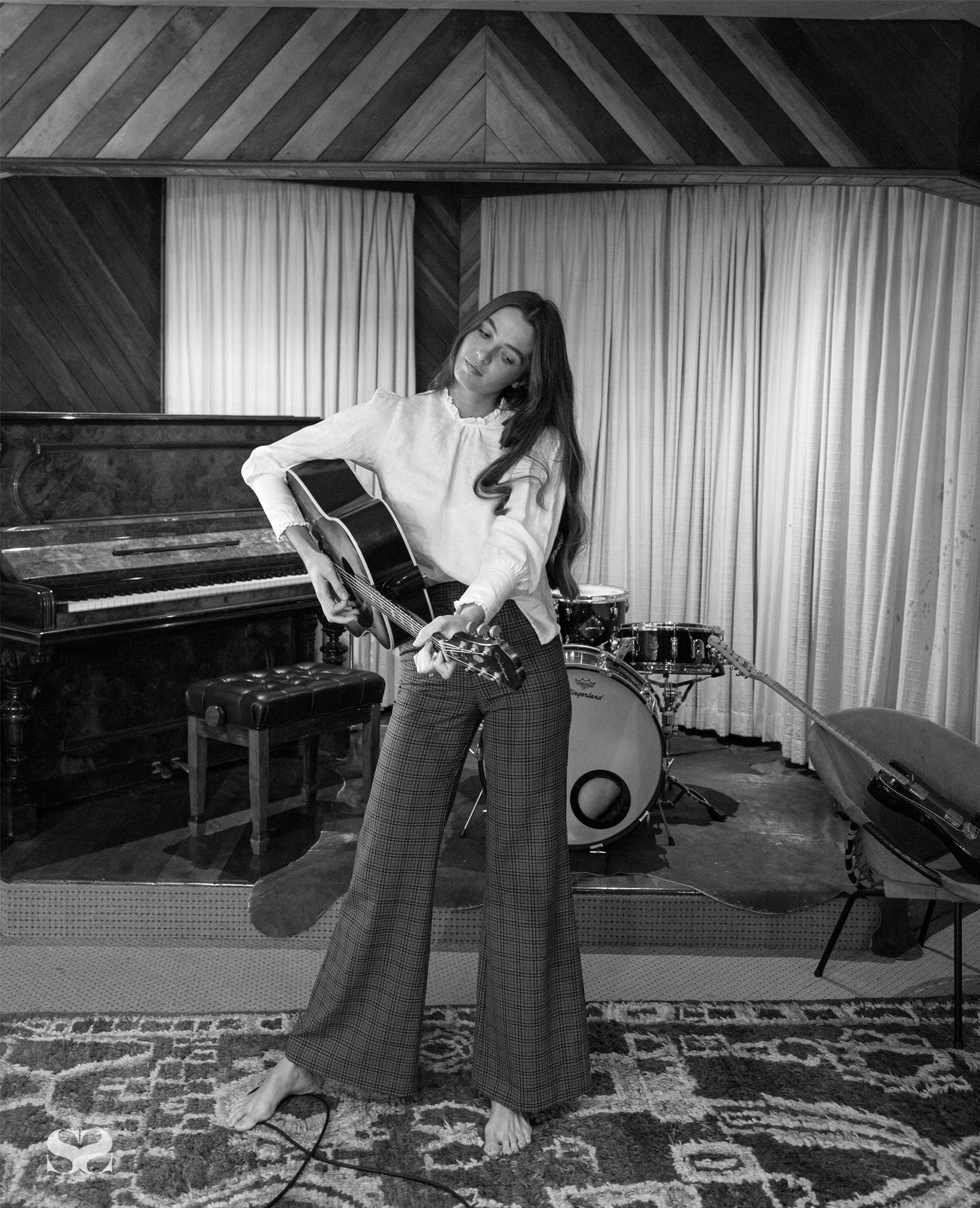 ROWIE THE LABEL top; van der KOOIJ pants; talent’s own rings (worn throughout).
ROWIE THE LABEL top; van der KOOIJ pants; talent’s own rings (worn throughout).
Your lyrics seem very much autobiographical; how important is it to you that you’re honest in your song writing?
It’s never been that important … I suppose, for me, I’ve always written songs to understand moments in my life, and I feel like I’ve heard a lot of artists say that, but it is therapy for me. To be honest, I don’t like that I do it. It’s this weird thing, I don’t like that everyone has this really strong insight. Because my lyrics are really quite truthful. For instance, I’ll write a song and I’ll show it to my husband and he’ll be like, ‘What? I didn’t know you thought that.’ I still get nervous about the fact that, yeah, people are going to have quite a big insight into how I’m feeling.
So how do you build the courage to put music into the world … or do you just kind of jump?
If it comes from my heart, it’s usually a really good song. I can’t deny, I can’t hold onto it and be selfish when I know that this moment and this exploration of an experience in my life might help someone else … so I’ve kind of come to terms with it. Sometimes I’ll write a song and I won’t think it’s good enough, but then when I show it to my team, people just know when something is authentic. They’ll be like, ‘Yeah, we’ll release this’, and I’ll be like, ‘Ooh, this one I didn’t think would get released.’
You just want to pull it all back in.
Yeah exactly; maybe I shouldn’t have shown that.
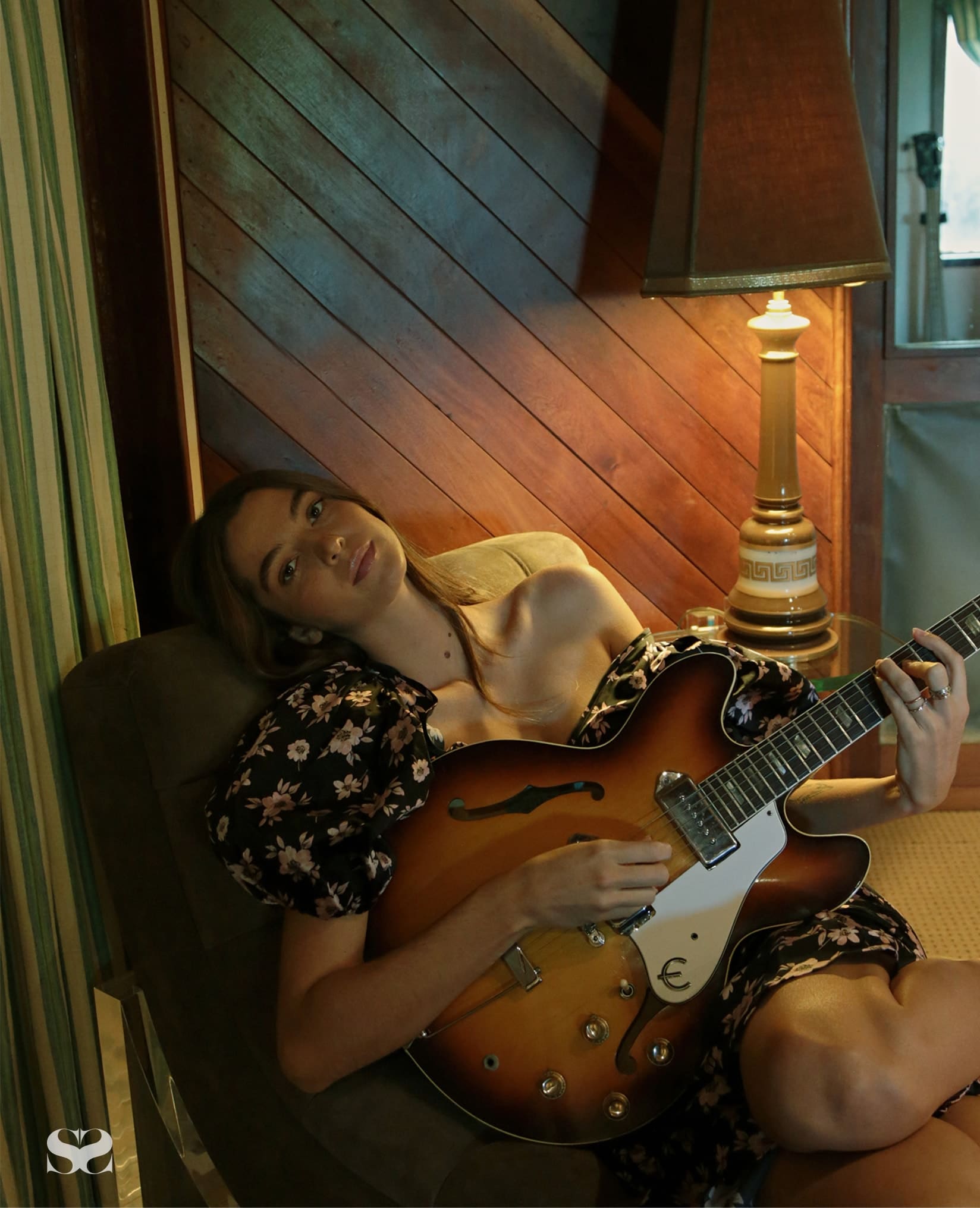 VAN DER KOOIJ dress.
VAN DER KOOIJ dress.
You’ve spoken before about feeling that you needed to be in trauma in order to write. Is that still true for you?
It’s just kind of come true: the moments that I’ve written about that have come from a traumatic place or a hard place ... they’ve always been the most successful songs or the ones that family really loves … I hope I can prove myself wrong, and I can write a song that might be a bit more light hearted for me, or I’m telling a story of a friend, or someone I know, or just making up a story and it can still do well. I’ve yet to, kind of, prove it.
How early in your life was music important to you?
I think from Year 3 I can remember all the instrument teachers coming to class trying to sell their instruments and I remember just being so excited to pick anything. There was this sexist moment; I remember there was this saxophone teacher, I was the only girl out of all the boys that put their hand up, and he looked at me and he goes, ‘Your fingers aren’t long enough to play the sax.’ And I was like six foot in Year 3. I’m glad he said that, though, because then I turned to my sister who played guitar and she helped me get into guitar. The long fingers helped.
Who were your first musical loves?
First was just Fleetwood Mac and Queen, just because they’re the records my mum constantly had on in the car to school. Lucky for me that was the case. Joni Mitchell, Carly Simon, all those people, Patti Smith: head over heels for. So, growing up they were my influences and for a long time, probably for the first couple of years of my career, I was really strong in referencing that musical taste. And then I found I was just boxing myself in too much doing that; I wasn’t allowing for fresh, new, modern sounds to come through. You know a producer would suggest a new sound and I was like, ‘It’s too scary for me!’ ... I think it was around when I was producing Hotel, that’s when I started to accept this doesn’t have to be a throwback song, it can be just what it is, instead of classing myself as a genre. I know I am pretty pop, alternative pop, but yeah … I have confidence when I’m at the production side of the song, that my taste in good music will come through, if that makes sense.
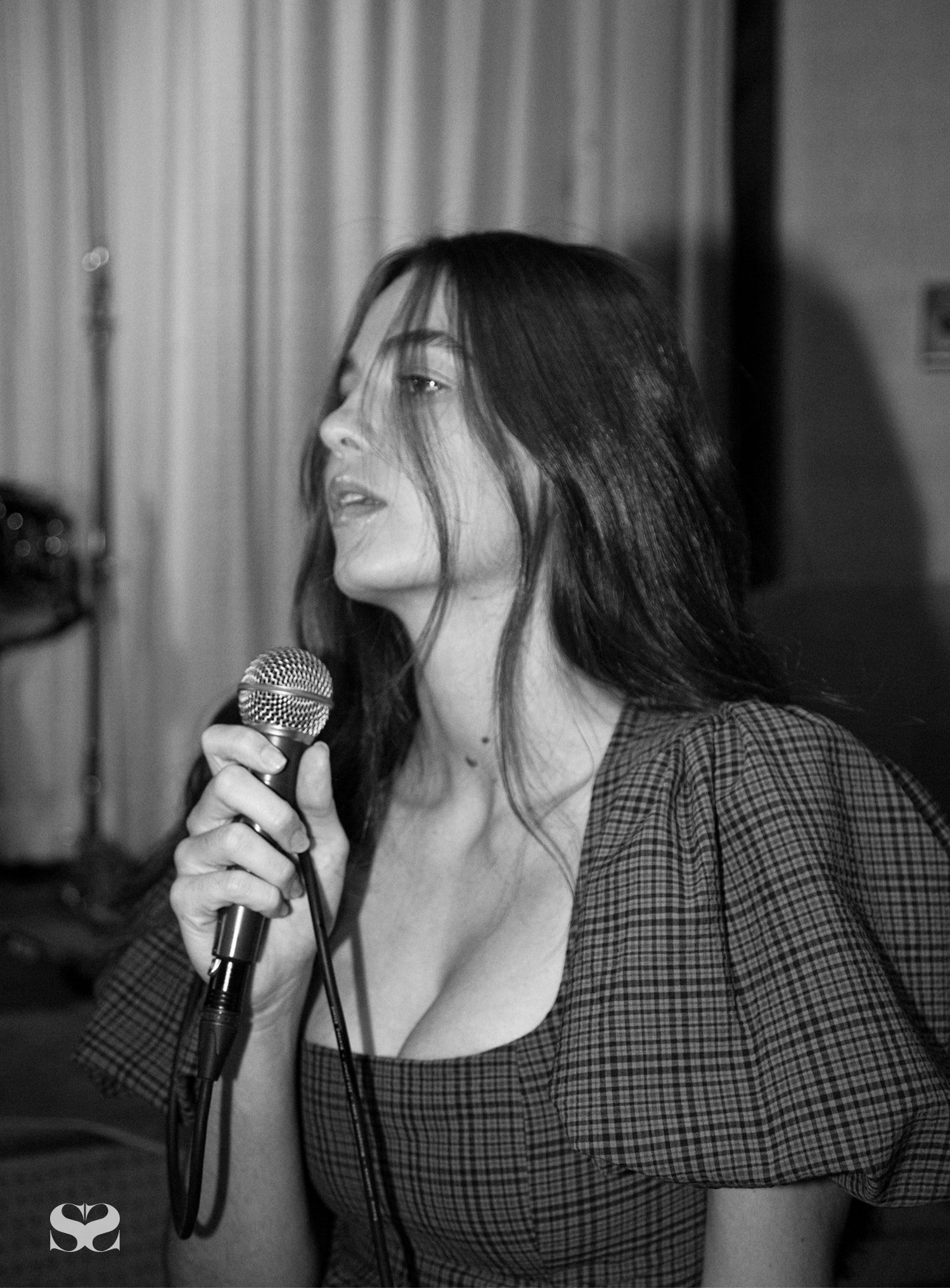 VAN DER KOOIJ dress.
VAN DER KOOIJ dress.
How do you feel about the pop tag?
I don’t hate it anymore. I used to be scared of it, but it’s just popular music. I’m not offended by it; I’ve embraced it a lot more. I never even used to listen to the top 40. I still don’t. But now … I will listen to stuff that I never would have in the past.
When have you felt you’ve had to be most courageous?
Two moments come to mind, and just personal moments, but when my husband, then boyfriend, had his traumatic brain injury, and I felt like I had to really step up to help look after him and help his recovery, which meant flying back from London, putting my career on a bit of a pause … I knew what the right thing was to do, and it was what I wanted to do. We were still quite new in our relationship, so it could’ve been something that I just put into the too hard basket, but I knew I had to be courageous for him. And I had to do it for myself, too. I had to know that I was capable of looking after someone and being there for someone.
And giving birth to my son at home. That was, I think, when I was in the moment I was like, ‘Fuck, I’m really strong for doing this.’ I was pretty naïve. I was 20 when I gave birth and I did it at home, drug free, and I was halfway through and I’m thinking, ‘I’m fucking crazy, who did I become? Like I should be in the hospital right now all drugged up.’ I look back at that and go, wow, I was really courageous to stand strong for a home birth. A lot of family and friends were worried about that, but that was a moment that I feel I’m really glad I stuck to it.
How do parenthood and creativity intersect for you?
It’s still something I’m figuring out, especially for me that I struggle with the idea of letting go of complete parenthood … I really want to be there a lot for my son. I really want to be there for the moments in his life, so finding time to write or finding time to go on tour when that was a thing was tricky. But I think with a lot of support from my team, I’m really now finding that balance a lot easier.
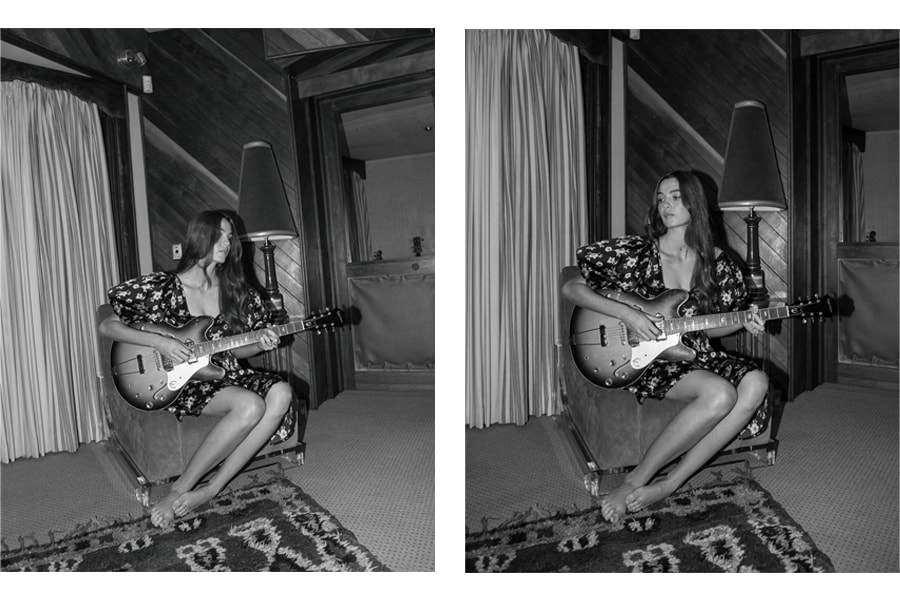
VAN DER KOOIJ dress.
Do you feel the need for a room of your own? How do you make space to create?
We live in a small house, too, so … my piano and all my instruments are in my son’s room. I think even for Owen – my husband’s job is really intense, more intense than mine even. So, for both of us, to have our own space is super important. But I just find moments, like when [my son is] in bed at night or when he’s asleep or even sometimes, I want to put on a movie and not feel guilty about it, and then I’ll find time to write …
You’ve recently released I Miss You, I’m Sorry. Are you good at saying sorry IRL?
I am actually … It helps me to listen more and not just talk, talk, talk, and think I’m this big macho person. When I say sorry, I’m able to listen to the other person’s story and their feelings, instead of just trying to get my point across. So yeah, I do say sorry a lot … My friends will be like, ‘You say sorry too much.’ And I’m like, ‘Yeah, but I like it.’
Last question: when do you feel most powerful?
Wow, I don’t know. That’s a really interesting question. Probably when I’m writing a song, probably in that moment when I create something from nothing and put my heart into it and my soul and know that it might be great one day. It’s just that creation, creating something from nothing, that feels really powerful.
THIS ARTICLE ORIGINALLY APPEARED IN THE COURAGE ISSUE, AVAILABLE HERE.
PHOTOGRAPHY Daniella Rech
FASHION Natalie Petrevski
TALENT Kita Alexander
HAIR & MAKEUP Ashlea Penfold @ Jane Artist Management
Shot on location at The Music Farm.



